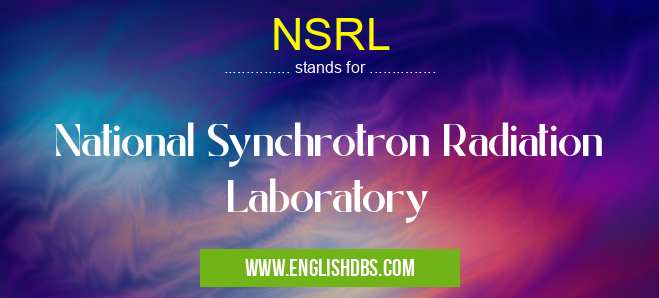What does NSRL mean in LABORATORY
NSRL stands for National Synchrotron Radiation Laboratory. It is a research laboratories based out of China dedicated to the study and development of synchrotron radiation technologies. Synchrotron radiation is a form of electromagnetic radiation generated by orbiting electrons, which are accelerated due to natural forces such as electric and magnetic fields. This radiation is used in many areas including medicine, material sciences, biology, chemistry, and physics. NSRL seeks to bring its expertise on the production and control of this novel light source together with world-renowned researchers from different fields to promote scientific advances.

NSRL meaning in Laboratory in Medical
NSRL mostly used in an acronym Laboratory in Category Medical that means National Synchrotron Radiation Laboratory
Shorthand: NSRL,
Full Form: National Synchrotron Radiation Laboratory
For more information of "National Synchrotron Radiation Laboratory", see the section below.
» Medical » Laboratory
Essential Questions and Answers on National Synchrotron Radiation Laboratory in "MEDICAL»LABORATORY"
What is National Synchrotron Radiation Laboratory?
The National Synchrotron Radiation Laboratory (NSRL) is a research laboratory operated by the China Academy of Sciences, providing facilities and services for basic and applied research in synchrotron radiation science. NSRL is located in Hefei, Anhui Province, and provides facilities for conducting experiments in various fields, including materials science, physics, biology and chemistry. The facility is equipped with an advanced accelerator system and an array of beamlines optimized for the production of high-energy X-rays.
What kind of research is conducted at NSRL?
Research conducted at the National Synchrotron Radiation Laboratory includes studies that use synchrotron radiation in various applications such as material characterization, surface science, biomedicine, and environmental sciences. Experiments conducted at NSRL also explore the physical properties of matter under extreme conditions to better understand its structure-function relationships.
How does NSRL generate synchrotron radiation?
Synchrotron radiation is produced by sending accelerated electrons on a circular path through magnetic fields with varying strength. This creates a highly intense light that can be used to investigate the properties of matter on an atomic level. At the National Synchrotron Radiation Laboratory this process is achieved using an advanced accelerator system and high-precision optics systems to form well-defined beams.
How can I apply to use NSRL's facilities?
Accessing the National Synchrotron Radiation Laboratory’s facilities requires submitting a proposal outlining your research requirements to NSRL’s Proposal Review Committee through their online portal. A team from the committee will review your proposal and make a decision within two to three weeks. Successful proposals will be granted access to the facility for up to one year with renewal options available upon request.
Where can I find more information about using NSRL's resources?
All information related to making use of NSRL’s facilities can be found on their website along with tutorial videos providing practical information on how to submit proposals or reserve beamtime slots online. The website also provides detailed instructions on preparing samples along with safety protocols required for safe operation when inside the lab premises.
Does NSRL provide training courses for new users?
Yes, NSRL regularly offers training courses designed especially for new users which cover topics such as proposal writing, sample preparation and equipment operation techniques necessary for carrying out experiments at their laboratory effectively and efficiently. These courses are held several times throughout the year both online as well as onsite at their premises in Hefei Anhui province China side.
Final Words:
As society continues exploring new realms of medical research and treatments made possible by technology advancements like artificial intelligence (AI) or nanotechnology (NT), NSRL’s role will likely become increasingly important in developing practical solutions stemming from its specialized knowledge on sources of intense electromagnetic radiations such as synchrotrons . Through its commitment towards promoting interdisciplinary collaboration between different scientific communities worldwide as well as its technological innovations tailored specifically toward medical applications , this leading research facility could put us on the brink of major medical advancements that would have long lasting benefits for generations ahead .
